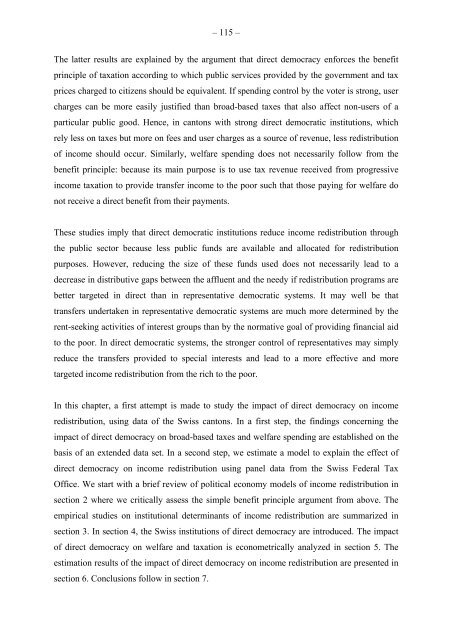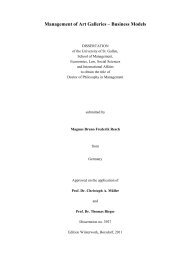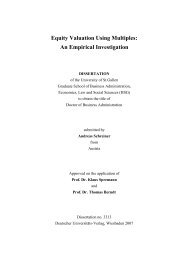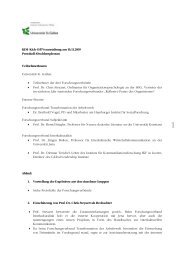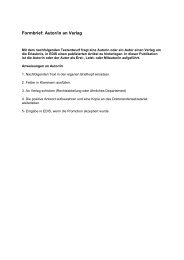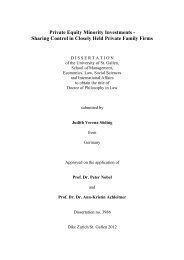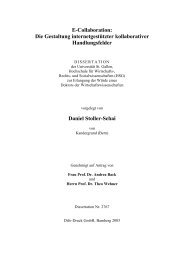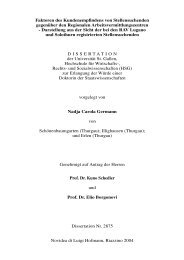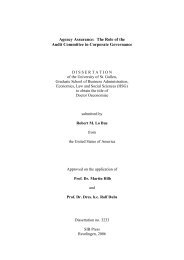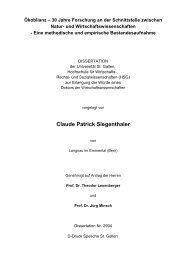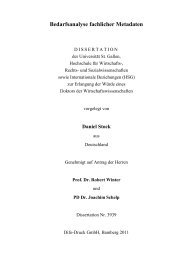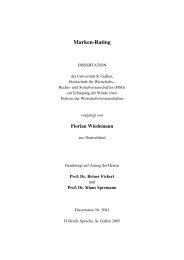The Impact of Direct Democracy on Society - Universität St.Gallen
The Impact of Direct Democracy on Society - Universität St.Gallen
The Impact of Direct Democracy on Society - Universität St.Gallen
- No tags were found...
Create successful ePaper yourself
Turn your PDF publications into a flip-book with our unique Google optimized e-Paper software.
– 115 –<str<strong>on</strong>g>The</str<strong>on</strong>g> latter results are explained by the argument that direct democracy enforces the benefitprinciple <str<strong>on</strong>g>of</str<strong>on</strong>g> taxati<strong>on</strong> according to which public services provided by the government and taxprices charged to citizens should be equivalent. If spending c<strong>on</strong>trol by the voter is str<strong>on</strong>g, usercharges can be more easily justified than broad-based taxes that also affect n<strong>on</strong>-users <str<strong>on</strong>g>of</str<strong>on</strong>g> aparticular public good. Hence, in cant<strong>on</strong>s with str<strong>on</strong>g direct democratic instituti<strong>on</strong>s, whichrely less <strong>on</strong> taxes but more <strong>on</strong> fees and user charges as a source <str<strong>on</strong>g>of</str<strong>on</strong>g> revenue, less redistributi<strong>on</strong><str<strong>on</strong>g>of</str<strong>on</strong>g> income should occur. Similarly, welfare spending does not necessarily follow from thebenefit principle: because its main purpose is to use tax revenue received from progressiveincome taxati<strong>on</strong> to provide transfer income to the poor such that those paying for welfare d<strong>on</strong>ot receive a direct benefit from their payments.<str<strong>on</strong>g>The</str<strong>on</strong>g>se studies imply that direct democratic instituti<strong>on</strong>s reduce income redistributi<strong>on</strong> throughthe public sector because less public funds are available and allocated for redistributi<strong>on</strong>purposes. However, reducing the size <str<strong>on</strong>g>of</str<strong>on</strong>g> these funds used does not necessarily lead to adecrease in distributive gaps between the affluent and the needy if redistributi<strong>on</strong> programs arebetter targeted in direct than in representative democratic systems. It may well be thattransfers undertaken in representative democratic systems are much more determined by therent-seeking activities <str<strong>on</strong>g>of</str<strong>on</strong>g> interest groups than by the normative goal <str<strong>on</strong>g>of</str<strong>on</strong>g> providing financial aidto the poor. In direct democratic systems, the str<strong>on</strong>ger c<strong>on</strong>trol <str<strong>on</strong>g>of</str<strong>on</strong>g> representatives may simplyreduce the transfers provided to special interests and lead to a more effective and moretargeted income redistributi<strong>on</strong> from the rich to the poor.In this chapter, a first attempt is made to study the impact <str<strong>on</strong>g>of</str<strong>on</strong>g> direct democracy <strong>on</strong> incomeredistributi<strong>on</strong>, using data <str<strong>on</strong>g>of</str<strong>on</strong>g> the Swiss cant<strong>on</strong>s. In a first step, the findings c<strong>on</strong>cerning theimpact <str<strong>on</strong>g>of</str<strong>on</strong>g> direct democracy <strong>on</strong> broad-based taxes and welfare spending are established <strong>on</strong> thebasis <str<strong>on</strong>g>of</str<strong>on</strong>g> an extended data set. In a sec<strong>on</strong>d step, we estimate a model to explain the effect <str<strong>on</strong>g>of</str<strong>on</strong>g>direct democracy <strong>on</strong> income redistributi<strong>on</strong> using panel data from the Swiss Federal TaxOffice. We start with a brief review <str<strong>on</strong>g>of</str<strong>on</strong>g> political ec<strong>on</strong>omy models <str<strong>on</strong>g>of</str<strong>on</strong>g> income redistributi<strong>on</strong> insecti<strong>on</strong> 2 where we critically assess the simple benefit principle argument from above. <str<strong>on</strong>g>The</str<strong>on</strong>g>empirical studies <strong>on</strong> instituti<strong>on</strong>al determinants <str<strong>on</strong>g>of</str<strong>on</strong>g> income redistributi<strong>on</strong> are summarized insecti<strong>on</strong> 3. In secti<strong>on</strong> 4, the Swiss instituti<strong>on</strong>s <str<strong>on</strong>g>of</str<strong>on</strong>g> direct democracy are introduced. <str<strong>on</strong>g>The</str<strong>on</strong>g> impact<str<strong>on</strong>g>of</str<strong>on</strong>g> direct democracy <strong>on</strong> welfare and taxati<strong>on</strong> is ec<strong>on</strong>ometrically analyzed in secti<strong>on</strong> 5. <str<strong>on</strong>g>The</str<strong>on</strong>g>estimati<strong>on</strong> results <str<strong>on</strong>g>of</str<strong>on</strong>g> the impact <str<strong>on</strong>g>of</str<strong>on</strong>g> direct democracy <strong>on</strong> income redistributi<strong>on</strong> are presented insecti<strong>on</strong> 6. C<strong>on</strong>clusi<strong>on</strong>s follow in secti<strong>on</strong> 7.


